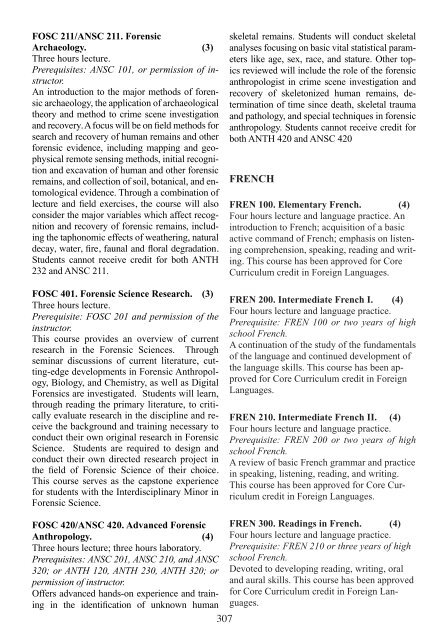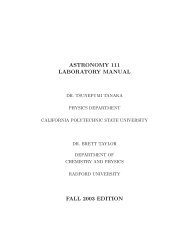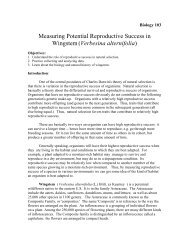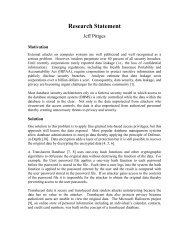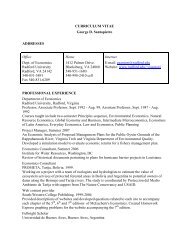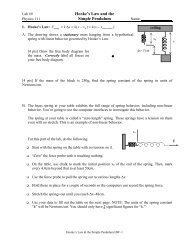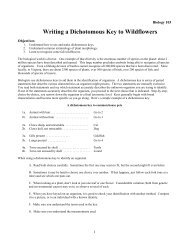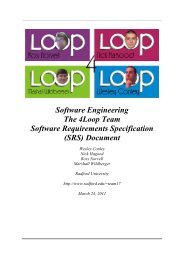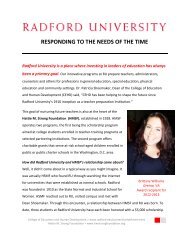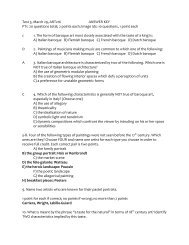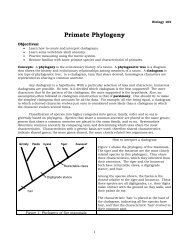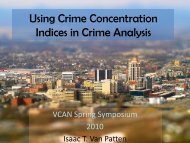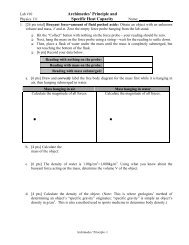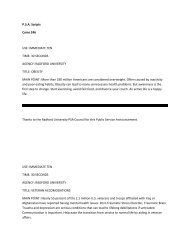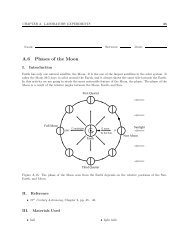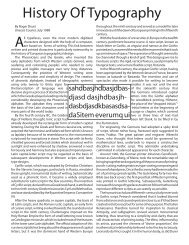Radford University Undergraduate Catalog, 2011-2012
Radford University Undergraduate Catalog, 2011-2012
Radford University Undergraduate Catalog, 2011-2012
You also want an ePaper? Increase the reach of your titles
YUMPU automatically turns print PDFs into web optimized ePapers that Google loves.
FOSC 211/ANSC 211. Forensic<br />
Archaeology. (3)<br />
Three hours lecture.<br />
Prerequisites: ANSC 101, or permission of instructor.<br />
An introduction to the major methods of forensic<br />
archaeology, the application of archaeological<br />
theory and method to crime scene investigation<br />
and recovery. A focus will be on field methods for<br />
search and recovery of human remains and other<br />
forensic evidence, including mapping and geophysical<br />
remote sensing methods, initial recognition<br />
and excavation of human and other forensic<br />
remains, and collection of soil, botanical, and entomological<br />
evidence. Through a combination of<br />
lecture and field exercises, the course will also<br />
consider the major variables which affect recognition<br />
and recovery of forensic remains, including<br />
the taphonomic effects of weathering, natural<br />
decay, water, fire, faunal and floral degradation.<br />
Students cannot receive credit for both ANTH<br />
232 and ANSC 211.<br />
FOSC 401. Forensic Science Research. (3)<br />
Three hours lecture.<br />
Prerequisite: FOSC 201 and permission of the<br />
instructor.<br />
This course provides an overview of current<br />
research in the Forensic Sciences. Through<br />
seminar discussions of current literature, cutting-edge<br />
developments in Forensic Anthropology,<br />
Biology, and Chemistry, as well as Digital<br />
Forensics are investigated. Students will learn,<br />
through reading the primary literature, to critically<br />
evaluate research in the discipline and receive<br />
the background and training necessary to<br />
conduct their own original research in Forensic<br />
Science. Students are required to design and<br />
conduct their own directed research project in<br />
the field of Forensic Science of their choice.<br />
This course serves as the capstone experience<br />
for students with the Interdisciplinary Minor in<br />
Forensic Science.<br />
skeletal remains. Students will conduct skeletal<br />
analyses focusing on basic vital statistical parameters<br />
like age, sex, race, and stature. Other topics<br />
reviewed will include the role of the forensic<br />
anthropologist in crime scene investigation and<br />
recovery of skeletonized human remains, determination<br />
of time since death, skeletal trauma<br />
and pathology, and special techniques in forensic<br />
anthropology. Students cannot receive credit for<br />
both ANTH 420 and ANSC 420<br />
FRENCH<br />
FREN 100. Elementary French. (4)<br />
Four hours lecture and language practice. An<br />
introduction to French; acquisition of a basic<br />
active command of French; emphasis on listening<br />
comprehension, speaking, reading and writing.<br />
This course has been approved for Core<br />
Curriculum credit in Foreign Languages.<br />
FREN 200. Intermediate French I. (4)<br />
Four hours lecture and language practice.<br />
Prerequisite: FREN 100 or two years of high<br />
school French.<br />
A continuation of the study of the fundamentals<br />
of the language and continued development of<br />
the language skills. This course has been approved<br />
for Core Curriculum credit in Foreign<br />
Languages.<br />
FREN 210. Intermediate French II. (4)<br />
Four hours lecture and language practice.<br />
Prerequisite: FREN 200 or two years of high<br />
school French.<br />
A review of basic French grammar and practice<br />
in speaking, listening, reading, and writing.<br />
This course has been approved for Core Curriculum<br />
credit in Foreign Languages.<br />
FOSC 420/ANSC 420. Advanced Forensic<br />
Anthropology. (4)<br />
Three hours lecture; three hours laboratory.<br />
Prerequisites: ANSC 201, ANSC 210, and ANSC<br />
320; or ANTH 120, ANTH 230, ANTH 320; or<br />
permission of instructor.<br />
Offers advanced hands-on experience and training<br />
in the identification of unknown human<br />
307<br />
FREN 300. Readings in French. (4)<br />
Four hours lecture and language practice.<br />
Prerequisite: FREN 210 or three years of high<br />
school French.<br />
Devoted to developing reading, writing, oral<br />
and aural skills. This course has been approved<br />
for Core Curriculum credit in Foreign Languages.


